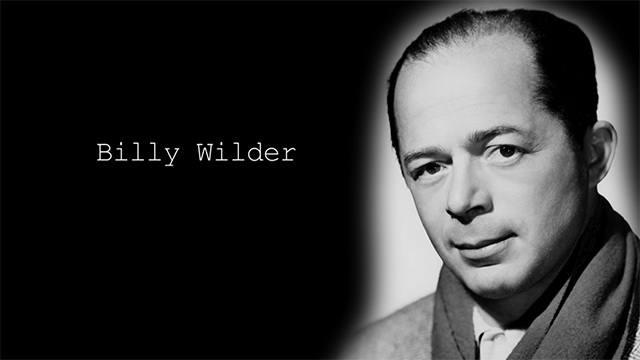Starting in early September, I started teaching this semester’s selection in my ongoing classic film series- BILLY WILDER, a Film Study. I will share with you my film notes. The below are my brief notes from our first class. As with my past courses (Film Noir, Screwball Comedy, Alfred Hitchcock, Ray Harryhausen), the first meeting is an overview of Wilder’s background, key elements of style, with a PowerPoint of highlights from his career. More to come!
BILLY WILDER, a Film Study
by Kellee Pratt

In this class we will explore the writer/producer/director Billy Wilder through his films, his collaborations, and his cinematic style. Known for his razor-sharp dialogue, Wilder mostly tackled comedies and yet, there was always an unmistakable ‘darker edge’ looking into the human character. He suffered great loss and tragedies from a young age, and his exploration into characters and storytelling tells us he didn’t suffer fools gladly.
As a huge fan of filmmaker Ernst Lubitsch, Wilder worked with him early on in his career and that infamous “Lubitsch touch” remained with him as a guiding influence his entire career. Drama, romance, slapstick, screwball, comedy, film noir, perhaps even a musical. Through a multitude of genres, Wilder mastered storytelling from the lens of a writer first.
Some described his approach that of a darkly cynical auteur. But considering he was just as famous for his diversity of genre as his collaborations, that label doesn’t quite stick. So, how do you define one of the most famous filmmakers of the 20th century, responsible for so many beloved, critically-acclaimed classic films? By what markers would you illustrate his signature? That’s what we’ll explore together.
Schedule:
9/9 ~ Introduction/ Overview
9/16 ~ BALL OF FIRE (1941)
9/23 ~ ACE IN THE HOLE (1951)
9/ 30 ~ STALAG 17 (1953)
10/7 ~ WITNESS FOR THE PROSECUTION (1957)
10/14 ~ SOME LIKE IT HOT (1959)
10/21 ~ THE APARTMENT (1960)
10/28 ~ THE FORTUNE COOKIE (1966)
We encourage participants to watch designated films at home, per schedule. However, you are not required to watch any/all the films outside of the class. For time allowance (depending upon the length of each film, and to allow time for discussion), we will not always be able to show an entire film inside of class. Expect to see clips and engage in discussions. We welcome your views! Handouts will be provided for further details.

What a dream job you enjoy.
LikeLike
Doesn’t pay enough to keep the lights on, but I LOVE it!!
LikeLiked by 1 person